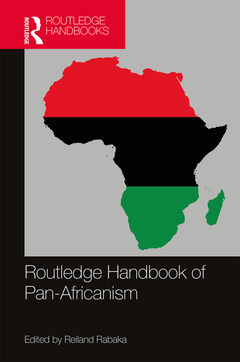Routledge Handbook of Pan-Africanism
Coordonnateur : Rabaka Reiland

The Routledge Handbook of Pan-Africanism provides an international, intersectional, and interdisciplinary overview of, and approach to, Pan-Africanism, making an invaluable contribution to the ongoing evolution of Pan-Africanism and demonstrating its continued significance in the 21st century.
The handbook features expert introductions to, and critical explorations of, the most important historic and current subjects, theories, and controversies of Pan-Africanism and the evolution of black internationalism. Pan-Africanism is explored and critically engaged from different disciplinary points of view, emphasizing the multiplicity of perspectives and foregrounding an intersectional approach. The contributors provide erudite discussions of black internationalism, black feminism, African feminism, and queer Pan-Africanism alongside surveys of black nationalism, black consciousness, and Caribbean Pan-Africanism. Chapters on neo-colonialism, decolonization, and Africanization give way to chapters on African social movements, the African Union, and the African Renaissance. Pan-African aesthetics are probed via literature and music, illustrating the black internationalist impulse in myriad continental and diasporan artists? work.
Including 36 chapters by acclaimed established and emerging scholars, the handbook is organized into seven parts, each centered around a comprehensive theme:
- Intellectual origins, historical evolution, and radical politics of Pan-Africanism
- Pan-Africanist theories
- Pan-Africanism in the African diaspora
- Pan-Africanism in Africa
- Literary Pan-Africanism
- Musical Pan-Africanism
- The contemporary and continued relevance of Pan-Africanism in the 21st century
The Routledge Handbook of Pan-Africanism is an indispensable source for scholars and students with research interests in continental and diasporan African history, sociology, politics, economics, and aesthetics. It will also be a very valuable resource for those working in interdisciplinary fields, such as African studies, African American studies, Caribbean studies, decolonial studies, postcolonial studies, women and gender studies, and queer studies.
Introduction: On the Intellectual Elasticity and Political Plurality of Pan-Africanism Part 1: Intellectual Origins, Historical Evolution, and Radical Politics of Pan-Africanism 1. The Origins and Evolution of Pan-Africanism 2. The Politics of Pan-Africanism 3. The Political Economy of Pan-Africanism: Imagination and Renaissance 4. From Pan-Africanism to Black Internationalism Part 2: Pan-Africanist Theories 5. Black Nationalism 6. Neo-Colonialism, Nkrumah and Africa-Europe Ties 7. Pan-Africanism and Decolonization: Between the Universal and the Particular 8. Africanization: Historical and Normative Dimensions 9. Black Consciousness 10. Afrocentricity 11. African Feminism 12. LGBTQI+ People in Africa Part 3: Pan-Africanism in the African Diaspora 13. W.E.B. Du Bois: From Pioneering Pan-Negroism to Revolutionary Pan-Africanism 14. Caribbean Pan-Africanism 15. Pan-Africanism and the African Diaspora in Europe 16. Pan-Africanism in France 17. "Long Live African Women Wherever They Are!": Black Women’s Pan-African Organizing during the Black Power Era Part 4: Pan-Africanism in Africa 18. Pan-Africanism in the Court: W. E. B. Du Bois and the Politics of Imperial Ethiopia 19. Kwame Nkrumah and Pan-Africanism in West Africa 20. Amilcar Cabral, Cabralism, and Pan-Africanism: The Dialectic of Revolutionary Decolonization and Revolutionary Re-Africanization 21. Pan-Africanism and the Anti-Colonial Movement in Southern Africa, 1950s-1990s 22. Women in Africa and Pan-Africanism 23. Queer Pan-Africanism in Contemporary Africa 24. African Social Movements 25. The African Union and the Institutionalisation of Pan-Africanism Part 5: Literary Pan-Africanism 26. Literary Pan-Africanism: Overview/Survey Essay 27. Literary Pan-Africanism in African Literature: The Epics of Chaka Zulu and Sundiata Keita 28. Literary Pan-African in Caribbean Literature 29. "…Black People, Come In, Wherever You Are…": Pan-Africanism and Black Internationalism in the Black Arts Movement 30. Maya Angelou’s Afrocentric Journalism: A Contribution to Pan-Africanism and the African Renaissance Part 6: Musical Pan-Africanism 31. Pan-Africanism in Jazz 32. Pan-Africanism in Funk 33. Pan-African Aesthetics: Pan-Africanism in Afro-Beat 34. Hip Hop and Pan-Africanism Part 7: The Contemporary and Continued Relevance of Pan-Africanism in the 21st Century 35. The Contemporary Relevance of Pan-Africanism in the 21st Century 36. Pan-Africanism and African Unity
Reiland Rabaka is Professor of African, African American, and Caribbean Studies in the Department of Ethnic Studies at the University of Colorado, Boulder. Additionally, he is a Research Fellow in the College of Human Sciences at the University of South Africa (UNISA). He is the author of more than 50 scholarly articles, book chapters, and essays, as well as more than a dozen books including: Du Bois’s Dialectics; Africana Critical Theory; Against Epistemic Apartheid: W.E.B. Du Bois and the Disciplinary Decadence of Sociology; Forms of Fanonism: Frantz Fanon’s Critical Theory and the Dialectics of Decolonization; Concepts of Cabralism: Amilcar Cabral and Africana Critical Theory;and The Negritude Movement.
Date de parution : 05-2022
17.4x24.6 cm
Date de parution : 05-2020
17.4x24.6 cm
Thème de Routledge Handbook of Pan-Africanism :
Mots-clés :
Young Men; Black Cross Nurses; intersectionality; Ivory Coast; african political theory; CLR; Négritude; Revolutionary Pan-Africanist; Garvey; UN; W.E.B; Du Bois; Pan-African Congresses; African diaspora; Literary Pan-Africanism; Pan-Africanism; African Descendants; Africana; Kwame Nkrumah; black studies; Pan-African Consciousness; Diasporic Africans; black feminism; Pan-African Conference; neo-colonialism; UNIA; African's feminism; Black Internationalism; African Feminism; Pan-Africanist Thought; Contemporary Society; African Unity; Radical Pan-Africanism; Western Sahara; African Descent; IASB; Central African Republic; African American Jazz



